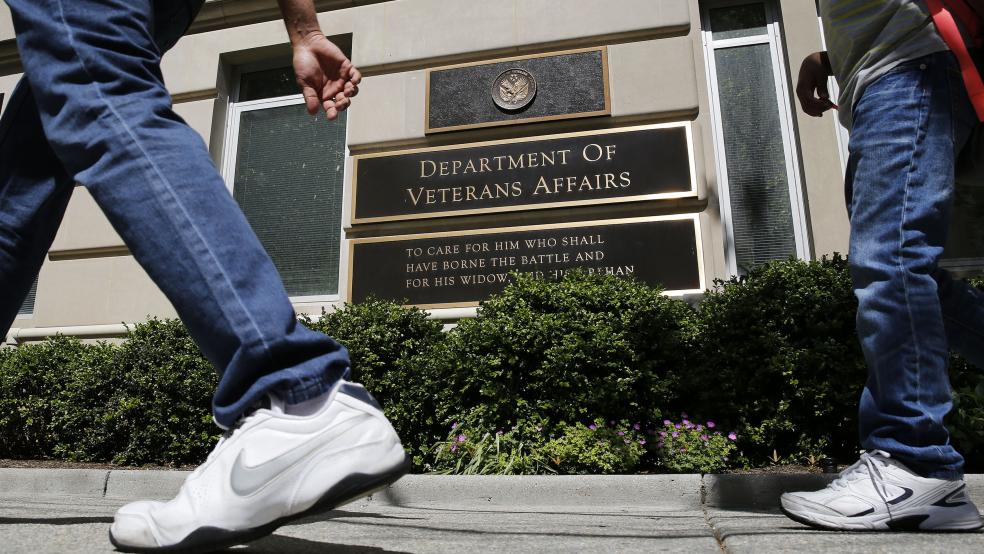Bob McDonald, the former Proctor & Gamble chief executive who was nominated by President Obama on Monday to take charge of the Veterans Affairs Department, will face a great challenge as he tries to reform the agency’s sprawling and scandal-ridden medical treatment system - a system that may have led to the deaths of many veterans who were forced to wait too long for care.
McDonald, 61, is a well-regarded corporate strategist and a one-time military officer who graduated from the U.S. Military Academy at West Point, N.Y., but he’s had no direct involvement in managing a huge medical treatment system. He’ll need all the good advice and counsel he can get to manage the VA’s 1,700 hospitals and clinics, assuming the Senate confirms him.
Related: Obama Targets a Twofer to Lead the VA: A Vet and a Former CEO
“My life’s purpose has been to improve the lives of others,” McDonald said Monday afternoon, speaking after the president at VA headquarters. “We need to put care for the veteran at the center of everything that we do at Veterans Affairs. At Proctor and Gamble, we always focus on our customer. At the VA, the veteran is our customer and we must all focus all day, every day on getting them the benefits and the care that they’ve so earned.”
White House Deputy Chief of Staff Rob Nabors may have actually given McDonald a head start in probing the depths of the problems of the VA health care system: He presented a report to Obama last Friday ahead of the announcement that McDonald would succeed former VA Secretary Eric Shinseki.
Nabors’ investigation found “significant and chronic system failures” and “a corrosive culture” at the VA that fostered poor management practices and retaliation against whistleblowers. While most VA workers are “dedicated, hardworking and committed” to those they serve, it is clear “there are significant and chronic systemic failures that must be addressed by the leadership at VA,” he wrote.
Ironically, a policy established by the VA in 2011 that set a 14-day maximum waiting period for scheduling primary and specialty care medical appointments proved so unrealistic that it may have “incentivized inappropriate action,” such as the creation of ghost waiting lists designed to hide the true lengths of the waits, according to Nabors.
Related: VA Bill Means a New $50 Billion Entitlement
In all, Nabors outlined six overarching problems plaguing the VA health system that need urgent attention. Here is McDonald’s “to-do” list, assuming he takes the VA’s reins, from the Nabors report:
• Scrap the 14-day standard for appointments and schedule them as early as possible. The 14-day guideline can’t be easily compared to those in the private sector; the performance goal is complicated to compute and comprehend.
Solutions: Appoint a group of health experts and leaders to review and list the “best practices for measuring timely delivery of health care” and make recommendations to the new Under Secretary of Health. Measures such as wait time data should be used as management tools but “not as a measure of whether high-quality health care has been delivered in an appropriate fashion.”
• Restructure the VA and institute reforms ASAP. Right now, the 1,700 hospitals and clinics serving 8.7 million veterans operate “with little transparency or accountability.” The VA in many cases delivers quality care, but the organization’s bureaucracy resists reform and change.
Solutions: The VA Central Office must be “much more hands on” in dealing with the field structure. That also means restructuring the VA and demanding greater accountability.
Related: 7 of the Most Outrageous Abuses at VA Medical Centers
• Begin to address a “corrosive culture” that has spawned personnel problems and hurt morale and the timeliness of health care delivery. This includes poor management and widespread distrust between employees and their bosses.
“There is a tendency to transfer problems rather than solve problems,” the report stated, as well as a culture “that tends to minimize problems or refuse to acknowledge problems” altogether. One-fourth of all whistleblower cases under review by the federal Office of Special Counsel are from the VA.
Solutions: Strengthen management and reporting practices at the central office and throughout the field, enhance accountability, and alter “the tone at the top” to encourage workers to speak up about problems.
• Reduce the amount of watchdog oversight of the VA, which has taken valuable time and resources. Congressional committees, the Inspector General and many other groups have all conducted extensive investigations. Over the past four-and-a-half years, the department has provided responses to over 104,000 congressional inquiries. The OSC currently has about 50 pending cases pending against the VA – all of which “allege threats to patient health or safety.”
Solutions: The VA should “more proactively” engage with various oversight bodies and do a better job of tracking oversight reports and recommendations.
• Replace the outdated IT system used for scheduling, which is causing delays. The VA began using the VistA electronic health records system in 1985 and it hasn’t changed appreciably since then.
Solutions: The VA must overhaul the outdated electronic scheduling system and hopes to award a contract by late this year. But immediate problems with scheduling system and practices can and must be addressed. “VA needs additional resources to ensure adequate and appropriate health care” for veterans, including the hiring of more primary and specialty care doctors, support staff and more exam rooms.
• Plan and invest now for anticipated changes in veteran demographics. “This includes geographical changes, an increased number of female veterans, a surge in mental health needs, an increase in special needs of younger veterans returning from Iraq and Afghanistan, and specific needs associated with a growing number of older veterans.”
Solutions: In the short term, the organization must work to increase the use of contract care. However, it must “proceed with this carefully, as proper oversight of the quality and timeliness of contract care is essential,” the report states.
Top Reads from The Fiscal Times:





